- Home
- Roxane Gay
The Best American Short Stories 2018 Page 25
The Best American Short Stories 2018 Read online
Page 25
The facade of the YMCA building was graying in parts, blotched like the face of a pretty woman who has spent the day crying; he could see that it had recently been presentable. He entered and signed in, paid his twenty-five dollars, and accepted his key, nodding thanks to the receptionist, a young black woman with a tight, old-fashioned bun at the nape of her neck. Looking him up and down with almond eyes (almost Persian, like his), she licked her gleaming teeth in momentary confusion. What was he doing there, in his long black trench coat that might have cost something in better days, his elegantly battered leather shoulder bag and sitar case? He wanted to say to her, Surely, young lady, respectable people pass over rough soil now and then? But if he said this, he would likely botch the English, draining the words of their poetry. Besides, she must already know it; she offered rooms for twenty-five dollars a night.
“No needles, weed, or weapons in your room,” she said, her voice flat. “There’s a shared kitchen and bathroom, but you need your own dishes and soap.”
He walked through the dark corridor, past the communal bathroom and kitchenette, to his first-floor room. Before turning the key, he said a word in prayer (these days he said his prayers to Bob Marley, though the recipient changed often). Each new YMCA rekindled his dread of what that first swing of the door would reveal: in some states, he was met with a room as nice as a countryside motel, with a clean white duvet and a quaint photo on the wall; in others a hovel, hospital sheets and burned patches on factory carpets. Inside, he removed the trench, folded it twice, and placed it carefully on the twin bed. Eyeing the shadows on the crimson bedspread, he thought better of it, and placed the coat on the chair instead. He pulled back the bedding, lifted the mattress, and checked every seam and corner for insects. From his leather satchel, he removed a wrinkled garbage bag and a box of baking soda and peeled back the duct tape on the box’s mouth. He placed his folded coat in the bag, sprinkled it with baking soda, and tied the end in a knot. He shook the package a little and left it on a shelf, the only available surface besides the chair and the bed. Then, he began the work of examining his sitar, polishing it, tuning it. He mourned his lack of funds, as the sitar needed new strings. When he was finished, he put away the instrument and turned his chair toward the window. The curtains were thick, a fading floral pattern, and smelled of long-extinguished cigarettes. He didn’t want to touch them. Instead, he watched the cars disappear from the parking lot outside—the teenagers going home after basketball, mothers leaving a yoga class.
He craved a coffee but thought it better to wait until dinnertime, when he could have his coffee with a meal and perhaps find a cluster of computers nearby so he could check what the Internet was saying about him today. He regretted breaking his laptop. But things break; this is a reality of life. He didn’t want to waste his days puttering around online as Yasmine did, no matter what her job title. And yet, he had to admit, as he watched the basketball players and yogis rush home, their hours bound by routine but also simplified by it, that he did waste a precious lot of hours just surviving. Looking for a new neighborhood, beginning from zero for the fifth time in a year, coordinating his meals around Internet locations, finding Laundromats, hunting teaching gigs and motels outside of town, visiting friends and hoping they would invite him to stay for the night. This, every day for weeks, including winters. Then, always, back to the YMCA.
As a matter of habit, he spent most of his daytime hours at the public library looking up music, always remembering to check the three big websites dedicated to his own career that the Internet had created in the past few years. He admired the artful arrangement of his photos and videos; his biography in both languages; the muffled, sorrowful tune (his own composition) that played when he clicked on the first page. Finding the sites had been a welcome surprise. For so long, when the Internet thought of “ustad Sokouti,” they thought of his father, who already had dozens of websites to himself. They must be witnessing a resurgence of interest in more modern renditions of classic songs, Rahad thought when he first came upon the sites. He considered showing them to Yasmine, since they might give her a feeling of security. He longed to be an asset to her, like American parents. Not a burden. But he never spoke of it; such topics always turned into fights.
To Yasmine, it seemed that Rahad had stopped journeying along with the rest of society somewhere around 1998. He had given up, sat in the road, and fiddled with his sitar until the others were far out of sight. Progress was not his talent—he liked the 1960s, even the ’70s, but beyond that, he had to be dragged. He had no health insurance, no acumen for anything technical, and was apparently an Internet bumbler. He had an outdated, off-line smartphone for his music, an old flip phone that held fifteen text messages at a time, no voicemail, and an email address Yasmine had set up that he checked every few days. Even so, he succumbed to some kind of scam almost monthly, each time thinking that the Web must have its rules and standards. “I wish you’d be more savvy online, Baba joon. It’s full of con artists looking for someone just like you,” she’d say. “I want you to be safe.” He didn’t know what safety had to do with it. Still, he made promises. “I promise you, Yasi joon,” he wrote in an email, “I will acquire Internet skills and general American savvy.”
The next morning, after a deep but troubled sleep, Rahad spent an hour disinfecting every surface, rechecking the pillows for bedbugs, and spraying every corner with insect repellant. When he was finished, he lit a sandalwood candle and put the Abyssinians on his portable CD player. The sound barely reached the four corners of his room, but it took all of a minute for someone to knock.
“What you are hearing there, neighbor?” a cheerful voice with a mixed-up Indian accent traveled through the flimsy wooden door. Rahad clicked his travel broom back into its plastic casing. He opened the door and said a muted greeting, trying hard not to react to the overpowering scent of patchouli and citrus that assaulted his nose. A dark man around his own age but more weathered, with thick gray stubble and a T-shirt that seemed to be made from an American flag, was smiling widely, displaying three yellow teeth that alternated with his white ones, like piano keys. He stepped inside, slapped Rahad on the back, and said, “Bro, do one thing. Please be putting on ‘Forward Jah.’ That is my favorite of this album by ten thousand percent.” His mouth made wide, deliberate motions.
He introduced himself as Wyatt, wandered to Rahad’s bed, and sat without invitation. He asked about Rahad’s origins in a way that suggested he saw himself as the more American of the two.
“Tehran,” said Rahad as he flipped to the song Wyatt had requested. “And you?”
“I am coming from DC,” said Wyatt, rubbing his knees with his palm. “An agreeable city. A first-class city. But bitch work to be surviving there, you know?”
Rahad tried not to chuckle. He had known many Indians. Most had accents with a hint of British, dulled after decades abroad. This man sounded American, but forcibly so, as if he had left Calcutta last week and, afraid of sounding “fresh off the boat,” as they say, was trying to compel his accent to fit the patterns and rhythms of natives through a heavy regimen of mangled Americanisms and mouth exercises. “And the name Wyatt? How did you get it, sahib?”
“What you are meaning?” he said, eyes wide.
“I mean, tell me your good name,” Rahad said. He wanted this Wyatt to know that he had traveled to India, that he knew the world this man had left behind, and that the only way to be Rahad’s friend was to own up to the real story.
“My good name?” said Wyatt, making a twisting gesture with his hand—as if plucking a ripe fruit from the tree—that absolutely gave away his origins. He grinned toothily. “I have not the least good idea what you are meaning. What finds you in this establishment, brother? Here is only down in the lucks, immigrants, some pot smokers, and that sort. You seem like nice old Irani gentleman, no disrespect.”
Rahad coughed into his fist. “We are same age, I think. Fifty-four, fifty-five?”
“Oh no, no, si
r,” Wyatt laughed, flashing his yellow teeth again. “I am just turning forty only. I am here temporarily. Who knows what is coming next for anyone.”
Having decided that the man suffered from some kind of mental illness, Rahad grew eager to expel him from his room. He wanted to gather his things and find an Internet café or library, but couldn’t overcome his Iranian manners—he would not kick out a fellow traveler. He nodded a few times and waited. But Wyatt only smiled and shook his head to the music. “Forward Jah!” he sang, not making the slightest motion to leave.
The next day Wyatt arrived at his door before breakfast. Apparently he had found naan, the soft, stretchy bread that Iranians and Indians share. “Do one thing. Eat this naan, Mr. Rahad, because you are surely missing your home.”
He hadn’t been home for two decades, but he didn’t mention this to Wyatt. Instead he focused on whether he should eat food offered by a crazy man. Would it be tainted? But what can you put in a chunk of plain naan? He ate some and agreed that it was good, freshly made like home. “You find tanoor around here? Where you buy this?”
Through a mouthful of bread Wyatt said, “No, no, is brick ovens here only. No tanoor. I am making dough in bathroom sink here, extra one I can be using all night for rising dough, then onward to my colleague at pizza joint for baking. Nice and fresher, cheaper breakfast than bagel or doughnut.”
“Clever,” Rahad muttered, giving the wet lump in his mouth a hard swallow.
Then Wyatt’s gaze fell on Rahad’s sitar in the corner of the room and his mouth hung open as if he had just seen a minor deity. “You have sitar? Holy shits!”
Rahad smiled. “And what does born-in-seventies DC native know about sitar?”
“I know every music, my friend,” said Wyatt, now bent at the waist, nose-to-nose with the instrument, struggling not to pluck a string. “Shall we be having jam sesh today later perhaps? I have familiarity on tambour, which is make-doable using large bucket. You play from Viguen. I order for brick oven. It will be first class.”
Rahad knew how to play Viguen. His father never played those songs, of course, since the legendary singer was his rival, and the old man felt obliged to dislike Viguen’s Westernized music and pop-star image. The elder ustad Sokouti was a classical sitarist of the most traditional school. He excelled on every ancient string instrument, but would never touch a modern guitar. “Yes, a nice idea,” he said.
He wasted the rest of the morning staring at parked cars, remembering those difficult months after Yas found out he had given up his house and become a drifter, an avareh, and he found out that she had put down her colored pencils (her last creative thread) and taken a tougher job at Google. One day he visited, and they paced her tiny apartment and shouted at each other.
“Did you want to stay the night?” She glanced over her blow-dryer. She was getting ready for a date. What did she hope for, he wondered, as she scrutinized these men over plates of oysters and fish tacos and bone marrow? The truth was almost certainly something he had failed to give her: a family, perhaps, or a home.
“I want to spend some time with you, yes,” he said. Such skill she had at shaming.
“Where did you park?” she asked, eyes fixed on the mirror. He patted some baking soda from his pant leg, hoping she didn’t see—every time he began a stint as a nomad, he found it clinging to him wherever he went, dustings of it on his shirt, in his jacket lining, in his sheets. The white powder was familiar and it amused him, but Yasmine would judge . . . if she could look away from her own reflection. Where did his daughter get this marble-hard vanity? Her mother had been a distracted scientist who memorized songs and didn’t bother with appearances—sometimes she left the house with crumbs in her hair. Once, she went out with only one eye made up, and that night Rahad loved her more than all the days before. Now here was her American daughter, free to imagine and create and trust the universe, but instead she slathered on a second layer like a veil. In that, she was no different than those caged-in Tehrani girls he saw during his long sessions on the Internet, the ones with high hair under a scarf, big sunglasses and nose-job plasters, desperate to show their creative spirit in whatever way possible, but, in the end, masking themselves in another way.
Oh, the Internet, that mystical hand, that unseen eye, a marvel! It was a captivation he tried to hide from Yas. She would only say, You don’t understand it, and conjure past arguments about art, vocation, legacy, and technological skill. Besides, who wants to admit to wasting their hours that way? He reached into his shoulder bag for the pistachios he had brought for her; the blushing, leathery bulbs, still in their outer skin, were every bit old Iran.
“Bus is easier,” he said. In fact, Rahad’s driver’s license had expired and he wanted to ask to use her address to renew it, since his PO box—his one remaining fiber of a root—had lapsed. He busied his hands skinning the fresh pistachios with his thumbnail. He had found them in a nearby Eastern market that he browsed before each visit, steered there by an inexplicable banner at the edge of his screen—maybe the Internet knew that Yas had been ten when they left Iran and that she missed it more than she understood.
She shut off the dryer and stared at him, all angry eyes and perilous heels, and he felt like a boy on a scorching Tehrani school yard, again caught drumming on three upturned buckets instead of playing soccer or running the perimeter as instructed. “I can’t believe this,” she whispered.
“I like my life,” he shot back. “No mortgage or bills. Everything easy and new. You might consider something more inspiring for yourself. You were so creative—”
“Jesus, Baba. Stop!” She slammed the blow-dryer on her dresser.
“Don’t call me Jesus,” he said, trying to lighten her mood with silly bazi, but her face grew colder and he had to look away, nodding to himself—no fun Yas tonight.
“Life isn’t these quixotic fantasies!” she continued. “Yeah, Iran was all long boozy dinners and guitars in the garden, but that was a different universe. And even there it was possible . . . look at your baba. He had music and a big house with a courtyard—”
Such marksmanship. He interrupted in English that slipped in anger. “Why I have to be like others? You say this insult words, except than . . . is lies. Is not quick-exotic fantasy.” No Iranian child would dare judge her parent this way. He had never spoken such words to his father, even as the old man napped away the mornings under a mosquito net and squandered hours on the veranda with his students, strumming three strings and ignoring everyone else. “Anybody can have black-and-white life by following some instructions. I choose colorful life. I want only to walk earth, find music, think . . .”
She turned and muttered in accented Farsi, “You’re fifty-four. Maybe it’s time to grow your own hands and feet.” The familiar Persian expression stung. Where had she learned it? It was the sort of thing that frightened, unimaginative parents said to their children before prodding and elbowing them into medicine or real estate, and he had taken care not to be that kind of parent. Every day when she was young, he had read poems to her. Every day they had drawn castles, plucked notes, and trained her imagination through daydreams. Had he relied on other people? He never stayed more than two nights, always left behind skillfully curated CDs, washed every sheet and towel, replaced any milk or food he had eaten with organic milk and homemade bread. But to American children words are cheap, effortlessly learned and quickly dispatched. They strike fast with the tongue, offering instruction on every small thing. How can words you don’t understand humiliate, they think, muttering their wisdom in low voices only to quench themselves.
Like the day he had arrived in New York to meet with his daughter in a café. She had time for only a coffee and she spent it telling him that he had disgraced himself online.
“Baba joon, it was creepy!” she had said. Creepy was a word with which he was familiar, but the connotations changed from moment to moment, and so it frightened him. She could have meant so many things. “If you like a photo, you cli
ck like. You don’t tag yourself. You especially don’t tag yourself on top of a picture of my friend in a bikini.”
“What is you mean?” he had said, unable to hold in his anger. “I only click like. I click like for photo of my daughter enjoying beach. You make everything dirty and horrible.”
“No, you tagged yourself,” she had sighed, trying to sound sympathetic, an instinct that made him all the more angry. “You have to learn Facebook.”
“In Iran,” he snapped, getting up from the table, “no child says to father, You have to learn. No one. I never say to my father, You have to learn guitar, even though he refuses out of pride, even though no one wants to hear sitar anymore. I never say this to him. You and your computer bazi. Is big waste of life, these Facebooks.”
Amid the hundreds of promises he had made to her on the day they left Iran, he had offered only one to himself: if exile was to demean and bruise him, fine; but it wouldn’t clip his wings, replacing his craving for music with drudgery and fears of risk. And yet, the fates are crafty and they had inflicted his daughter with the very disease he despised. Yasmine, who had an American accent, who never mixed up her idioms and knew an insult from a joke and exactly what to say next, a girl who had every opportunity, had taken to taking root—a provincial instinct. At ten years old, she had set down her little suitcase, sharpened her pencils, and, like many good Iranian immigrants, set to work on her sensible American life: study, then do something joyless and technical with a steady paycheck.
After their argument at the café, he had thrown his laptop across the room (the guestroom of an old friend, a composer), shattering the screen. He quit Facebook from a library desktop. He didn’t need a computer. If he didn’t have one, Yasmine could never humiliate him with another explanation. She would just stick to complaining about his distracted, itinerant ways. And how could he make her see how life had unfolded for him? Bringing her out of Iran with two suitcases and a sitar between them, stumbling from place to place, always at the mercy of chance, until he found their home in Baltimore. There he had stayed, teaching music to the children of rich Iranians and Turks all over Maryland and Delaware. Then Yas went off to college—Harvard, he was proud to say. He had begged her (a humiliating act, particularly in Farsi) to study music or art. “Computer science is the same at U of M or D or anywhere,” he had said. “Please, azizam, Harvard has an art library that would wake Rumi from his grave.” She had moaned. “You know, other Iranian dads would be proud.” So he watched her graduate, move to New York, and start her first job. Then he set off into the world again, treading the unknown, always aching for stories, songs, adventure. Yes, he wanted a home, but purpose, inspiration, art: those are the soul’s truest needs.

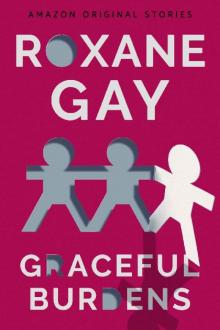 Graceful Burdens (Out of Line collection)
Graceful Burdens (Out of Line collection)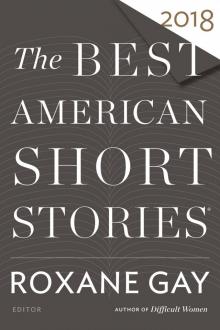 The Best American Short Stories 2018
The Best American Short Stories 2018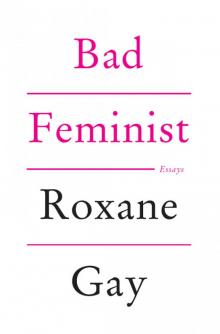 Bad Feminist
Bad Feminist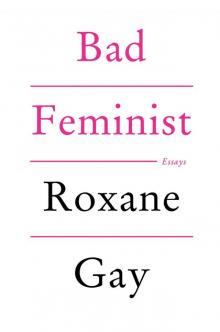 Bad Feminist: Essays
Bad Feminist: Essays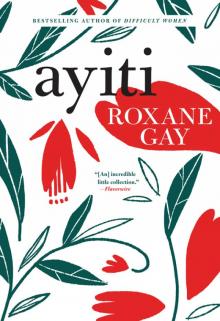 Ayiti
Ayiti Difficult Women
Difficult Women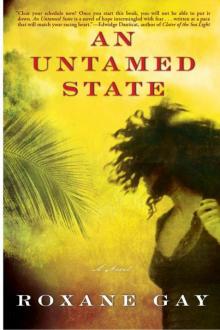 An Untamed State
An Untamed State Hunger
Hunger